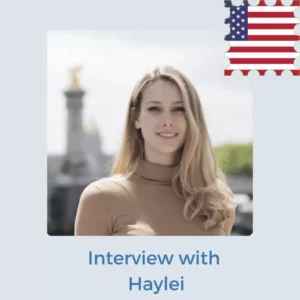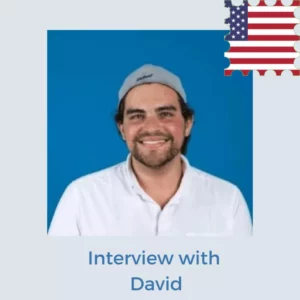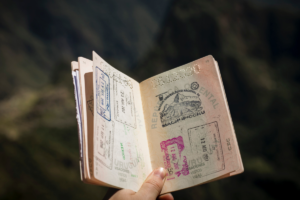Urban Index: Hello Jiangshan, how did you end up in France?
Jiangshan: Four years ago I was working in Singapore and I wanted to shift my career to “not in the shipping industry”. I was looking for a master degree outside of Singapore, because I wanted to leave. Thinking about Europe at the time, so I was just basically choosing a business school in Europe.
I did some research, then I found ESSEC and I found my program, Master in Strategy & Management of International Business in the Corporate Strategy track. That’s how I ended up in France in 2019.
Urban Index: I assume you applied as an overseas student?
Jiangshan: Yes. There was an application process. And there’s a fee for studying as an overseas student. We have to pay to go to university in France. In terms of the application process, first of all, you need to have the GMAT (Graduate Management Admission Test). You need to have a good GMAT-score in order to apply for the business program.
I remember I spent six months while I was also working to prepare for the GMAT. I took the exam and I got my score, afterwards I could start my application process. If we only take into consideration the application process with ESSEC, it takes about three months. I started thinking about a master degree somewhere around the end of 2018. I got confirmation in May 2019, I came to France in September.
Urban Index: Did Essec help you with this move? Singapore to Paris is pretty significant.
Jiangshan: They helped me once I arrived in France, to organise my student hostel and also bank accounts. They didn’t help a lot.
Urban Index: Did they give you general guidelines and say you’re on your own now?
Jiangshan: Nope.Nothing. It’s on you to discover how the French system works.
Urban Index: Do you have a Carte Vitale?
Jiangshan: Yes, I have a Carte Vitale. The process was very complicated. I remember as a foreign student we have a social security number for foreign students. I used that for about one year, but after graduation I needed another social security number which took me some time to have. When I wanted to apply for the real card I had some login problem at the beginning, the system, it just didn’t work as you would expect it to. I actually had to call customer care to explain my login problem, they in turn had to set it up manually on their side, to make the system work properly. That’s how I got my real profile on that website. I ordered my card from that website.
Urban Index: Did you have to make that phone call in French?
Jiangshan: Yes. I asked my friends to call on my behalf.
Urban Index: Let’s skip ahead. You studied, you graduated. How was that process of finding an apartment?
Jiangshan: For me it was pretty easy because there were a lot of Chinese landlords. We have a Chinese third party platform where we can look for apartments, they’re all owned by some Chinese person.
Urban index: How do you get access to that platform?
Jiangshan: It’s insider information. Everybody speaks Chinese on this website, everything is built in Chinese. I would assume only Chinese people will use that platform. Chinese people are much more flexible. They required less paperwork. Things usually get done very quickly, and they’re pretty helpful too.
Urban Index: How did you find your job?
Jiangshan: I found my first full-time job through Essec’s alumni network actually. They have an excellent network. I remember there was an entrepreneur session where they invited a lot of alumni of Esec who had started their own business. That’s how I met my previous employer.
He ran a startup focused on the social media world. I directly spoke with the founder of the company. We talked on WhatsApp and he hired me in that process. After that job I searched for jobs on Welcome to the Jungle or LinkedIn.
Urban Index: You’re studying, you’re graduating, you made some friends. Did a lot of these friends stay in Paris as well?
Jiangshan: French people stayed in Paris, or they went back to their own cities in France. Most Lebanese and Moroccan friends stayed in Paris. Because this was during Covid, most Chinese people went back home. I think I was the only one who stayed. Some other international people who didn’t speak French went to the Netherlands. Some of them went to Luxembourg, and some of them went to Germany.
Urban Index: How did you go about building out your social life? Was it easy for you?
Jiangshan: I didn’t really make an effort to meet up with people on purpose. I mean, I had a good situation at my job.We are all similar in age and it’s super easy to make friends with other international people. I will still connect with my old school friends. My friends are my colleagues, school friends and some other Chinese people from Courbevoie, which is where I live, there is a large Chinese community. I didn’t really make friends with French people, I feel.
Urban Index: How come?
Jiangshan: I will take things naturally. I don’t want to make friends on purpose. If I meet some French people along the way, yeah, of course, I like to get to know them. On the other hand, I feel they’re not as open. Some French people that are super open-minded, like a lot of the people where I work. My mom always wanted me to make friends with French people for me to get used to life and living in France.
Urban Index: Did you ever experience any language barriers?
Jiangshan: It was hard sometimes, especially in school. I was studying in the international program, but most students were French. In my class at least 70% I remember. There also were a lot of Americans and Lebanese, so whenever they spoke, they spoke French. I felt a little bit alone sometimes but it was also good because when I stayed with the Lebanese or Moroccan people, they spoke English with me, they understood that the Chinese girl didn’t know French and adapted to me. When I stayed with a group of French people, nobody wanted to make an effort to speak English.
Urban Index: How would you describe your level of French today?
Jiangshan: It’s a shame to say, but for now I only understand basic French and I speak basic French.
Urban Index: I’m curious about the cultural differences that you have experienced.
Jiangshan: In China, when we want something, we just ask directly. We don’t say, hi, how are you? Hope you’re doing well. We don’t really do smalltalk. I’m from the Asian culture and people are most of the time more introverts and they are pretty shy.
French people can also be shy sometimes, but they’re still more open than the Asian culture. I especially feel it at my work. Even in school where I met lots of people from Morocco, from Lebanon, and Latin America people, they are much more expressive. In China or Singapore, people are not usually not willing to share what they really feel, they want to hide it inside until you discover it. So what you say doesn’t necessarily mean what you want. In China, you have to feel what they really think or what they really want to say. They won’t say it directly.
Urban Index: Did you ever get scammed or did you have any bad experiences here?
Jiangshan: I would say the tremendous effort that I have to make whenever I was doing anything related to an administration task or with the bank, or with my visa. That was all a bad experience. And the level of how digitised France currently is.
Whenever I want to renew my visa or whenever I want to check anything in the prefecture, I remember that I always need to block half of my day, it takes me half an hour to look at the website to find out the right information, to go to the correct page and to make the correct reservation. And once I found the correct page, I have to save it immediately so that I can still find this webpage the next time. Otherwise I will spend another 30 minutes just looking for that page again.
With the bank, I always have to find someone who speaks English. If I want to change my phone number or change my address, I need to spend lots of effort coordinating with the people. You know, in Singapore, everything is done in just like three clicks and you’re finished. Whenever you need some help, you just go to the branch. Worst case, you go to the branch and then you talk to one guy and he will settle everything for you.Here they send you to the other branch because you’re not with this branch, you’re with the branch five kilometres away, but they’re closed today because it’s Saturday.
Urban Index: I’m assuming that when you were a student, you had a student visa. Did your employer have anything to do with you getting your visa later, or did you have to do everything yourself?
Jiangshan: In my last company I had to do everything myself. It was a very young startup. They were unsure about how to apply for a Visa as a foreigner. My company today has an HR department who knows how to do it properly. I just need to apply online and make sure that things are properly put in progress.
Urban Index: What do you like the most about living here and your new life here?
Jiangshan: I love the fact that Europe is so connected. If I live in Paris, I can go everywhere for my holidays. In Paris, I love the company that I’m working for. I feel lucky to have found this kind of international company in Paris. After finding my job on Welcome to the Jungle, I applied over a year ago but didn’t succeed, so I subscribed to their recruitment newsletter. I kept receiving this newsletter and when they advertised a job I could do, I scheduled another call with them. I followed the recruitment process and got hired!
Urban Index: What is your favourite place in the city?
Jiangshan: I live in Courbevoie. There are a lot of retired people and school kids. It’s more like a calm family area. We have a market every Saturday morning, which is super crowded, I love seeing all the grandmas and grandpas buy their vegetables, meat or seafood there. I like the fact that my life is separated between work and after work. Once I finish work, I leave Paris, I go to Courbevoie where it’s another world purely for resting. If I work or I want to have some fun, I go to Paris.
If you ask me my favourite place in Paris, I would say Montmartre because it’s beautiful. It’s always beautiful. I didn’t really remember what the history is there, but I know there is a movie that was filmed there, Le Fabuleux Destin d’Amélie Poulain. After the movie I went to Montmartre and said, yes, it’s true, it’s very beautiful. But there are a lot of pickpockets!


